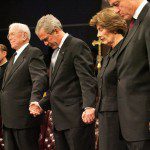A couple of months back, I was invited to come to the world headquarters of the Wesleyan denomination in Indianapolis to talk with a group of professors from Indiana Wesleyan University’s seminary about how we can train tomorrow’s pastors better in the area of faith, work, and economics. This series of posts is from the two talks I gave there.
 As we start our reflections today, I think a fair question is: Why does the church today find itself needing to pour time and effort into connecting our people’s faith with their work? Shouldn’t it be obvious that God cares about all aspects of our life as human beings, and that he works in many ways through our work?
As we start our reflections today, I think a fair question is: Why does the church today find itself needing to pour time and effort into connecting our people’s faith with their work? Shouldn’t it be obvious that God cares about all aspects of our life as human beings, and that he works in many ways through our work?
Then I read key contemporary thinkers in the faith-and-work movement, and a picture emerges. I’d put it like this:
Evangelical Christians are really, really good at “the middle part” of the grand story told in the Bible. We have atonement and salvation down pat. We’ve memorized the four spiritual laws and can bring people through the “Roman Road” to salvation. In other words, we really “get” what Christ did for us on the cross, and how that applies to our lives through the wonderful gift of salvation. After all, as my mentor Grant Wacker says, an evangelical is someone who gets on a bus, walks up to someone and says “Is this seat saved? Oh, by the way, are you?”
But the events of the atonement are only the “middle” of the Biblical story of salvation. Before the cross, two other, very important things happen. First, creation. Second, incarnation. And after the cross, of course the Resurrection – with the end of the story has yet to be written. And the end is not just rapture and heaven. Biblically, it is described as the New Heaven and the New Earth. Theologians roll these together in the phrase “New Creation.”
So we have Creation, Incarnation, and New Creation. But most of us—or at least, many of our students—are pretty fuzzy on these three key parts of the Bible narrative. And because we’re fuzzy on these things, we super-spiritualize our faith. Faith is about the stuff we do on Sunday, at Church. But darned if we know how it is supposed to connect with our Monday-to-Saturday life, most of which involves work.
We’re like the 5th-century heretic Nestorius, who taught that Christ was sometimes a divine person, and sometimes a human person, but never both at the same time. One moment he’d be healing and forgiving sins as God, the next he’d be walking the dusty roads of Galilee or breaking bread with sinners, a humble servant of God who said that he didn’t even know the day or the hour of the end times. We’re just like that: we can’t figure out how to bring our “spirit man” and our “natural man” together in everyday activities like work.
And the only biblical way to get past this is to reconnect with Creation, Incarnation, and New Creation.
Originally published at Grateful to the Dead.












